2012 浙江杭州师范大学综合英语考研真题
1_____ growing in Congress to consider
I.Fill in the blanks with proper words given below and write the correct ones on
your answer sheet: 10 %
Washington is again seeking to increase pressure on Beijing to allow its currency
to rise against the dollar, with_____
legislation aimed at reducing the US trade deficit with China.
US pressure over the Chinese currency has been _____ 2_____ since last July when
China revalued the Renminbi by 2 per cent and _____ 3_____ its decade-long exchange
rate peg to the
dollar. But the Bush administration and members of Congress are
_____ 4_____ that the Renminbi has since been allowed to rise by less than 1 per
cent against the dollar.
While
officials
criticism of their currency _____ 6_____, Wu Xiaoling, vice-governor of the
People’s Bank of China, admitted that Beijing needed to open its capital account
further to create more foreign exchange demand and a more market-oriented exchange
rate. Ms Wu told Caijing Magazine that China
encourage
investment surpluses.
John Snow, US Treasury secretary, hinted strongly last week that his department
was_____ 9 _____ formally to accuse China of being a “currency manipulator” in
its next report on trade and exchange rates, saying the regime that Beijing
introduced last summer had not led to _____ 10_____ flexibility.
companies to go_____ 8_____ to reduce the country’s trade and
_____ 7_____ and
have
consistently_____ 5_____ international
should
boost
Chinese
more
J) exports
I) softened
A) threats
B) broke
C) rejected K) hesitant
D) likely
E) considered
F) greater
G) management
H) remarks
O) wider
L) disappointed
M) abroad
N) imports
II. Proof reading 10%
The passage contains TEN errors. Each line contains ONE error. In each case, only
ONE word is involved. You should proofread the passage and correct it and write the
correct ones on your answer sheet.
We often speak language as a vehicle of expression—a metaphor that can 1.____
illumine many aspects of our foreign-languages teaching situation. 2.____ Language
is a vehicle of meaning that we do not even realize we are used; 3.____
in other words, a vehicle that is transporting a person’s message to somewhere
�
4.____but is not itself the object of the trip. After students can use such a 5.____
vehicle for their purposes they must be constructed, and this construction 6.____
requires blueprint and various stages of production, with tryouts 7.____ as the
various of sections and combinations are assembled — tryouts 8. ____ during what
has been assembled to date is used, if only 9.____ momentarily, for its ultimate
purpose. By our language vehicle 10.____this ultimate purpose is expression: people
revealing themselves to, or disguising or hiding themselves from, other people.
III.Read the following passages. Answer the questions on each text by choosing A,
B, C or D, and write the correct ones on your answer sheet. 20%
Passage One
Joseph and Hannah Brown appeared to be indestructible. For as long as I could remember
they had lived together in the same house by the common. They had lived there, it
was said, for fifty years; which seemed to me for ever. They had raised a large family
and sent them into the world, and had continued to live on alone, with nothing left
of their noisy brood save some dog-eared letters and photographs.
The old couple were as absorbed in themselves as lovers, content and self-contained;
they never left the village or each other's company, they lived as snug as two podded
chestnuts. By day blue smoke curled up from their chimney, at night the red windows
glowed; the cottage, when we passed it, said 'Here live the Browns,' as though that
were part of nature.
Though white and withered, they were active enough, but they ordered their lives
without haste. The old woman cooked, and threw grain to the chickens, and hung out
her washing on bushes; the old man fetched wood and chopped it with a billhook, did
a bit of gardening now and then, or just sat on a seat outside his door and gazed
at the valley; or slept. When summer came they bottled fruit, and when winter came
they ate it. They did nothing more than was necessary to live, but did it fondly,
with skill - then sat together in their clock-ticking kitchen enjoying their
half-century of silence. Whoever called to see them was welcomed gravely, be it man
or beast or child; and to me they resembled two tawny insects, slow but deft in their
movements; a little foraging, some frugal feeding, then any amount of stillness.
They spoke to each other without raised voices, in short chirrups as brief as
bird-song, and when they moved about in their tiny kitchen they did so smoothly and
blind, gliding on worn, familiar rails, never bumping or obstructing each other.
They were fond, pink-faced, and alike as cherries, having taken and merged, through
their years together, each other's looks and accents.
It seemed that the old Browns belonged for ever, and that the miracle of their
survival was made commonplace by the durability of their love - if one should call
�
it love, such a balance. Then suddenly, within the space of two days, feebleness
took them both. It was as though two machines, wound up and synchronized, had run
down at exactly the same time. Their interdependence was so legendary we didn't
notice their plight at first. But after a week, not having been seen about, some
neighbours thought it best to call. They found old Hannah on the kitchen floor feeding
her man with a spoon. He was lying in a corner half-covered with matting, and they
were both too weak to stand. She had chopped up a plate of peelings, she said, as
she hadn't been able to manage the fire. But they were all right really, just a touch
of the damp; they'd do, and it didn't matter.
Well, the Authorities were told; the Visiting Spinsters got busy; and it was decided
they would have to be moved. They were too frail to help each other now, and their
children were too scattered, too busy. There was but one thing to be done; it was
for the best; they would have to be moved to the Workhouse.
The old couple were shocked and terrified, and lay clutching each other's hands.
'The Workhouse' - always a word of shame, grey shadow falling on the close of life,
most feared by the old (even when called The Infirmary); abhorred more than debt,
or prison, or beggary, or even the stain of madness.
Hannah and Joseph thanked the Visiting Spinsters but pleaded to be left at home,
to be left as they wanted, to cause no trouble, just simply to stay together. The
Workhouse could not give them the mercy they needed, but could only divide them in
charity. Much better to hide, or die in a ditch, or to starve in one's familiar kitchen,
watched by the objects one's life had gathered - the scrubbed empty table, the plates
and saucepans, the cold grate, the white stopped clock....
'You'll be well looked after,' the Spinsters said, 'and you'll see each other twice
a week.' The bright busy voices cajoled with authority and the old couple were not
trained to defy them. So that same afternoon, white and speechless, they were taken
away to the Workhouse. Hannah Brown was put to bed in the Women's Wing, end Joseph
lay in the Men's. It was the first time, in all their fifty years, that they had
ever been separated. They did not see each other again, for in a week they both were
dead.
1.At the beginning of the story, the old couple
A.depended on their family for their livelihood
B.lived by doing small jobs for their neighbours
C.looked after themselves quite well
D.were still as vigorous and hard-working as ever
�
2.The main impression a visitor had of them was that they
A.always gave him a warm welcome
B.never got in each other's way, despite their awkward movements
C.never spoke to each other
D.were alike in speech and movement
3.When the neighbours found them, the old couple
A.didn't seem greatly concerned
B.no longer had the strength to eat
C.were both laid out on the floor
D.were in despair
4.From the writer's point of view, the attitude of the Authorities was
A.cruel and vindictive
B. irresponsible and careless
C. natural and sensible
D.well-meaning but unimaginative
5.Faced with the prospect of going to the Workhouse, Joseph and Hannah
A.hid when the Authorities tried to take them away
B.made up their minds to die
C.showed their ingratitude to the Visiting Spinsters
D.were more afraid of being separated than of dying
Passage Two
It is rightly said that “the sun has long set on the British Empire , but it is
�
a different story for the language of that nation. English is expanding its reach
in dramatic fashion. Using the channels of business and space, the language is
breaking free and breaking over cultural barriers.”
It is an unprecedented linguistic phenomenon, “unique in the history of the world,”
stated Braj Kachru, an Indian linguist recognised as one of the foremost authorities
on the use of English. But the most interesting point brought up by Kachru is his
observation that, as English steadily becomes more and more an international
language, it is now ‘Englishes’ which have taken root in many countries, rather
than strictly the British or American English that foreign students devoted their
efforts to a generation or two ago. Thus Malaysia, Pakistan, India, Nigeria, the
Caribbean, and the Philippines are among the host of nations often mentioned as
having their own forms of English widely used domestically. Although English is not
so widely used in countries such as Japan and those of Latin America, it is
nevertheless widely taught for its usefulness as a window to the outside world. In
China alone, there are easily more people studying or using English in one way or
another than the total population of the United Kingdom. An official may personally
dislike English because he doesn’t know it, but will do his best to see his children
have a good command of English, knowing how much it will mean for their future.
The globalisation of English has long since run beyond the mother country itself.
Unlike the Latin based languages of French and Spanish, the English language has
never had an official academy to determine what’s acceptable in the language and
what’s not. Attempts to form one have never been successful. One result is “a very
big part of the world’s English speaking activity takes place completely within
the realm of non-native speakers.” The late professor Stevens of Cambridge
University predicted: “English will be taught mostly by non-native speakers, to
non-native speakers, in order to communicate with non-native speakers.” One sees
this happening in Hong Kong, mainland China and all over the world.
Also true is what Stanford University’s Charles Ferguson wrote more than 20 years
ago. “English is less and less regarded as a European language, and its development
is less and less determined by the usage of its native speakers.” We leave to
futurists whether too much local adaptation will bring about the decay of the English
language. For his part and his views on “world Englishes” Kachru contends that
he was “not attaching a value judgement, but just stating realities.”
If it is accepted that one of the realities is “English is less and less regarded
as a European language,” it follows that when people learn English nowadays it is
not wholly for the purpose of talking to native speakers or to somehow become a part
of a Western culture.
“The spread of English,” said Larry Smith from Honolulu University, “is not a
factor which causes cultural differences to disappear, but… offers a medium to
�
express and explain these differences.” Seen in this light the international appeal
of English could well serve as a vehicle for the mutual enrichment rather than the
clash of civilisations.
6.Which of the following may be inferred from the text:
a.Latin based languages are more difficult to learn
b.French and Spanish should not be used as international languages
c.It is advantageous to have an academy setting language standards
d.None of the above
7.The author suggests:
a.English is no longer a European language
b.Any countries have their own style of English
c.English development should be determined by native speakers
d.Using English leads to the Westernisation of many countries
8.Which of the following may be inferred from the passage?
a.Local adaptation will ruin the purity of the English language in the long run
b.More English speaking activities will be done by non-native English speakers
c.More and more people are learning English to communicate with native speakers
d.No official academies can succeed in controlling the use of languages
9.According to Kachru
a.English is having difficulty breaking through cultural barriers
b.The spread of English is causing cultural differences to disappear
c.A generation or two ago British and American English were the standard forms learnt
d.Pakistan English is completely different to British and American English
�
10.One can infer that
a.Globalisation of English is running out of control
b.English may serve as a vehicle for mutual enrichment between nations
c.Most officials are trying to learn some basic English
d.The British Empire is still strong
IV. Reading and writing: 30%
Read the following passage and decide whether the statements after the passage are
true or false.(10%). Write a summary of the Passage within 80-100 words (20%).
Write your answers on your answer sheet.
At any given time, more than a million international students around the world are
engaged in the study of the English language in a predominantly English-speaking
country. The five most popular destinations, in order of popularity, are the US,
Britain, Australia, New Zealand, and Canada. The reasons for choosing to study
English abroad differ with each individual, as do the reasons for the choice of
destination.
Numerous studies conducted in Britain and the United States show that the country
of choice depends to a large extent on economic factors. While this should not provoke
much surprise, careful analysis of the data suggests that students and their parents
are most influenced by the preconceptions they have of the countries considered for
study abroad. The strength of international business connections between countries
also gives a good indication of where students will seek tuition. In the main,
students tend to follow the traditional pattern of study for their national group.
The US attracts the most diverse array of nationalities to its English language
classrooms. Throughout the non-European world, in Asia and North and South America
especially, the course books used to teach English in most elementary and high
schools introduce students to American English and the American accent from a very
early age. Canada also benefits from worldwide North American exposure, but has the
most homogenous group of students--- most with French as their first language. Before
furthering their English skills, students in Europe study from predominantly British
English material; most Europeans, naturally, opt for neighbouring Britain, but many
Asian, Middle-Eastern, and African students decide upon the same route too.
Australia and New Zealand are often overlooked, but hundreds of thousands of
international students have discovered the delights of studying in the Southern
Hemisphere. The majority are Asian for reasons that are not difficult to comprehend:
the proximity of the two countries to Asia, the comparatively inexpensive cost of
�
living and tuition, and perhaps of most importance to many Asian students whose
English study is a prelude to tertiary study, the growing awareness that courses
at Australian universities and colleges are of an exceptionally high standard. In
addition, revised entry procedures for overseas students have made it possible for
an increasing number to attend classes to improve their English for alternative
reasons.
Australia and New Zealand have roughly the same mix of students in their language
classrooms, but not all students of English who choose these countries are from Asia.
The emerging global consciousness of the late twentieth century has meant that
students from as far as Sweden and Brazil are choosing to combine a taste for exotic
travel with the study of English.
The US and Britain will always be the first choice of most students wishing to study
the English language abroad. However, economic considerations undoubtedly wield
great influence upon Asian and non-Asian students alike. If student expectations
can be met in less traditional study destinations, and as the world continues to
shrink, future international students of English will be advantaged because the
choice of viable study destinations will be wider.
A. the true or false statements: 10%
1.There are presently more than 1,000,000 foreign students of English abroad.
2.Study destination choices are mostly influenced by proximity to home.
3.Students of the same nationality usually make similar study choices.
4.English language classrooms in the US have the widest range of student
nationalities.
5.Standards at Australian and new Zealand tertiary institutions are improving.
B. Summary writing: 20%
V. Translation:40%. Write your answers on your answer sheet.
A.Put the following parts into English: 20%
男女分校,总的来说是有利有弊。所以,对待这一问题很多国家都采取了顺其自然的方法,
一方面允许单性别学校的存在,另外一方面对这类学校存在的意义展开了研究。澳大利亚教
育部进行的一项为期 10 年的研究认为,研究称分校有助排除异性干扰,利于男女提高成绩。
女子学校的女生往往比那些在双性别学校学习的女生更能发挥领导才能,也更喜欢理科,而
男子学校的男生则比双性别学校的男生更喜欢音乐和艺术,从而扭转了普通学校中男生重
�
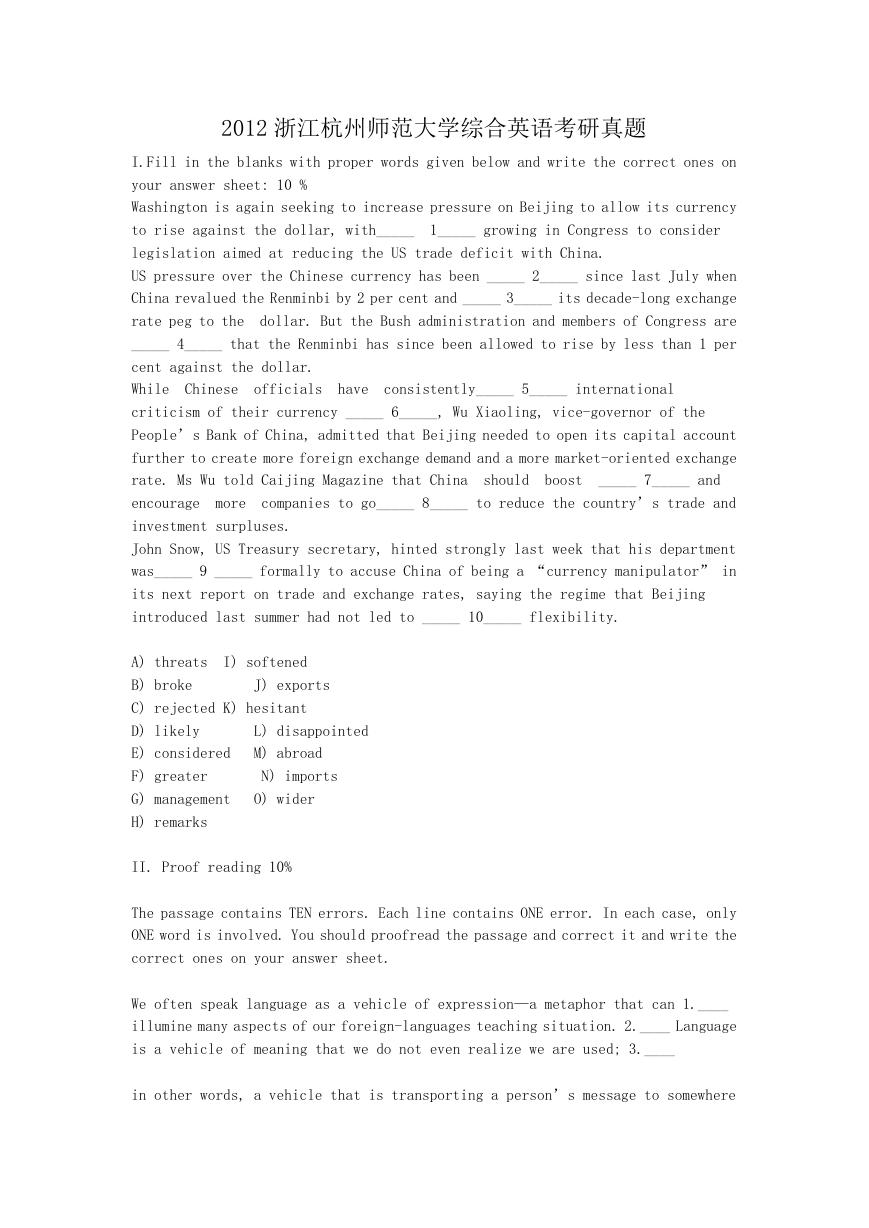
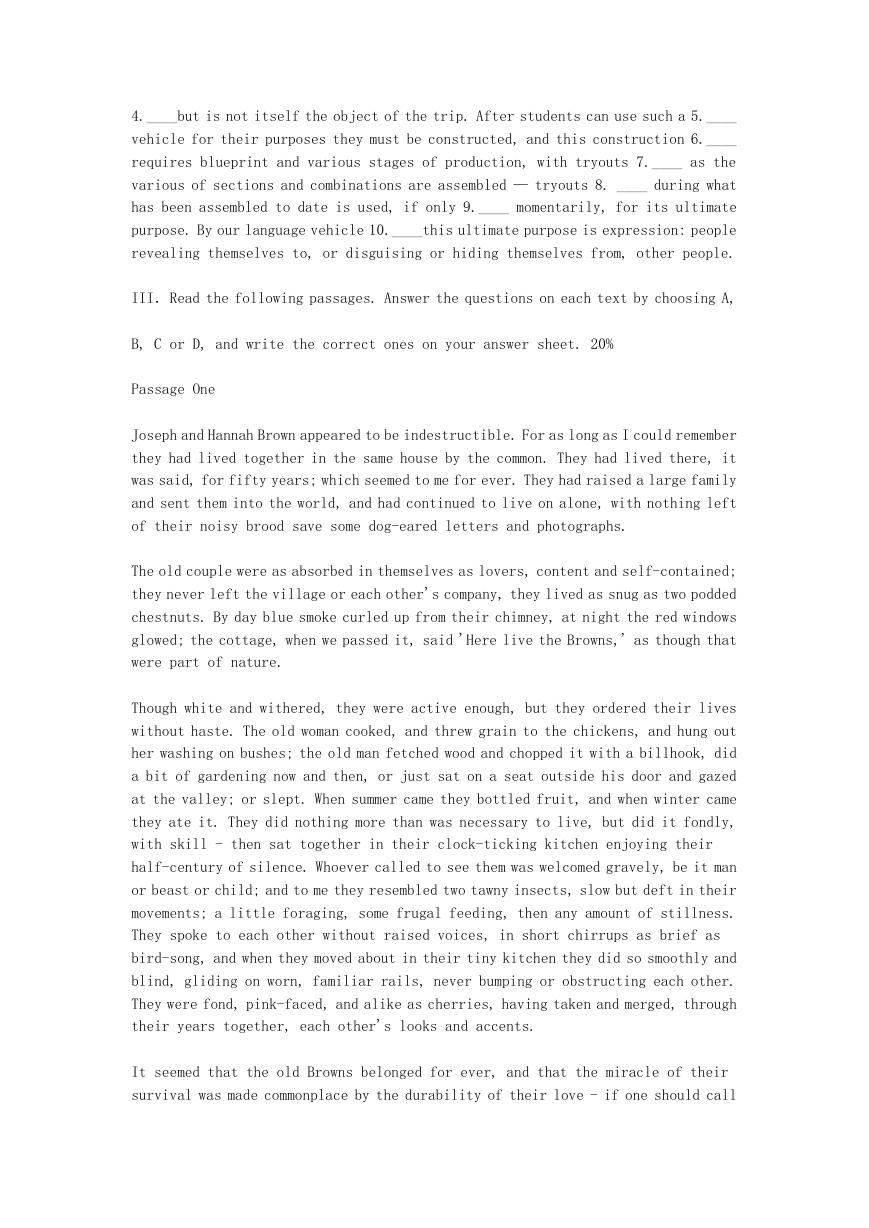
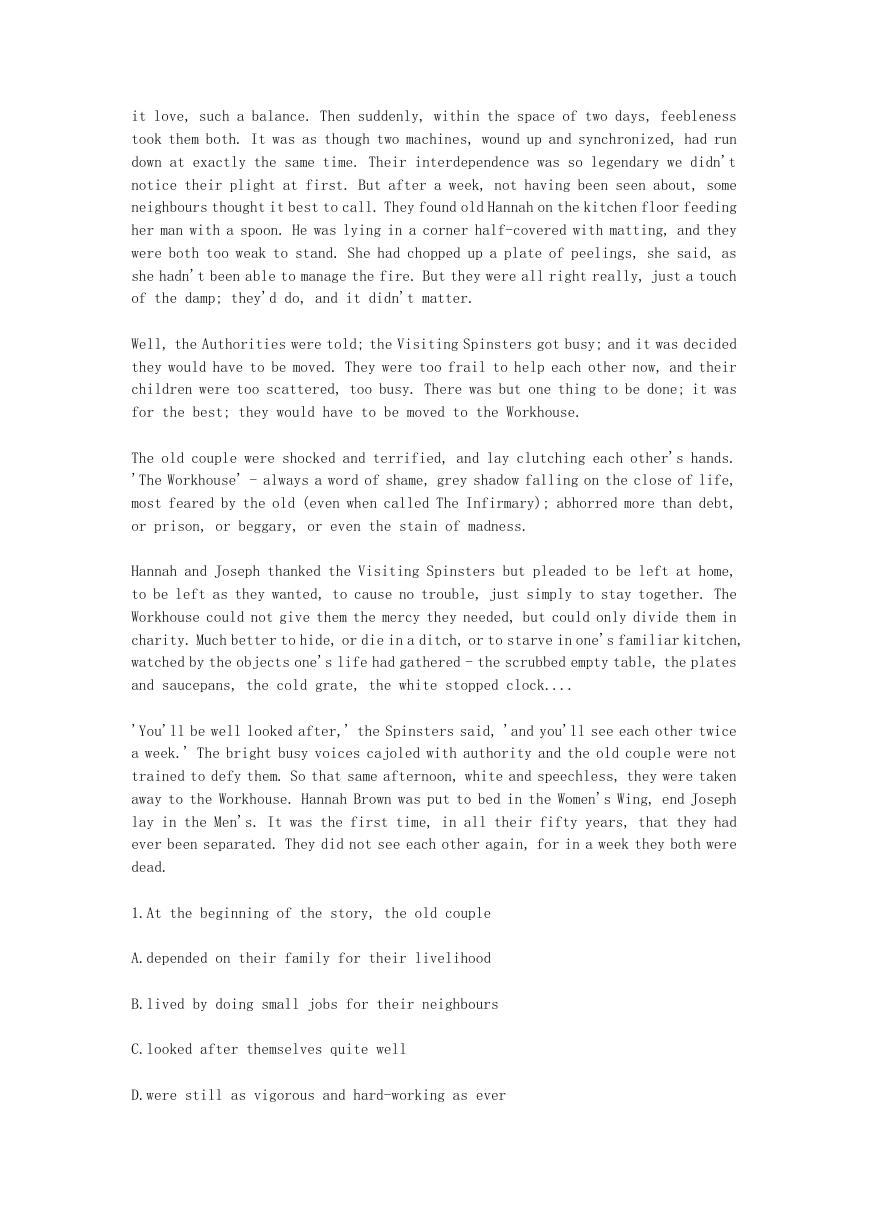

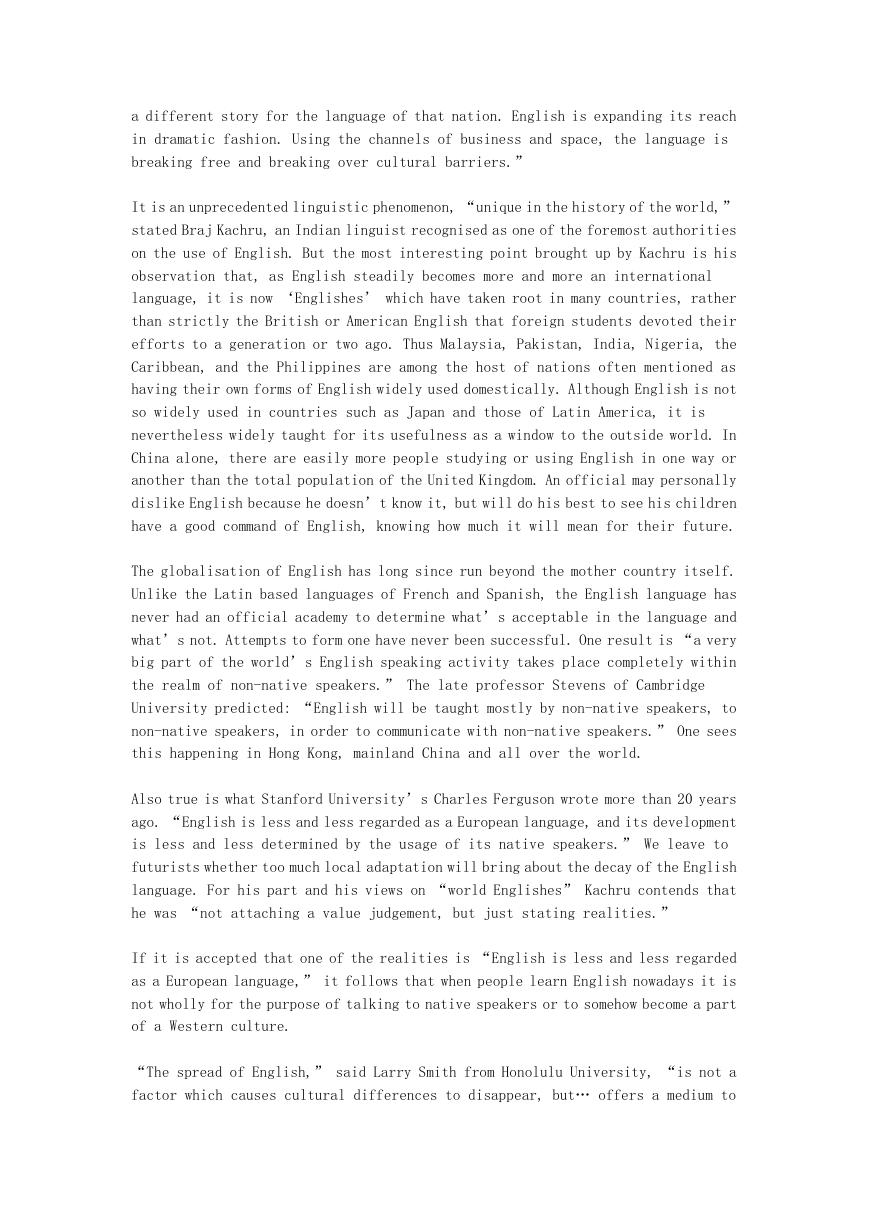
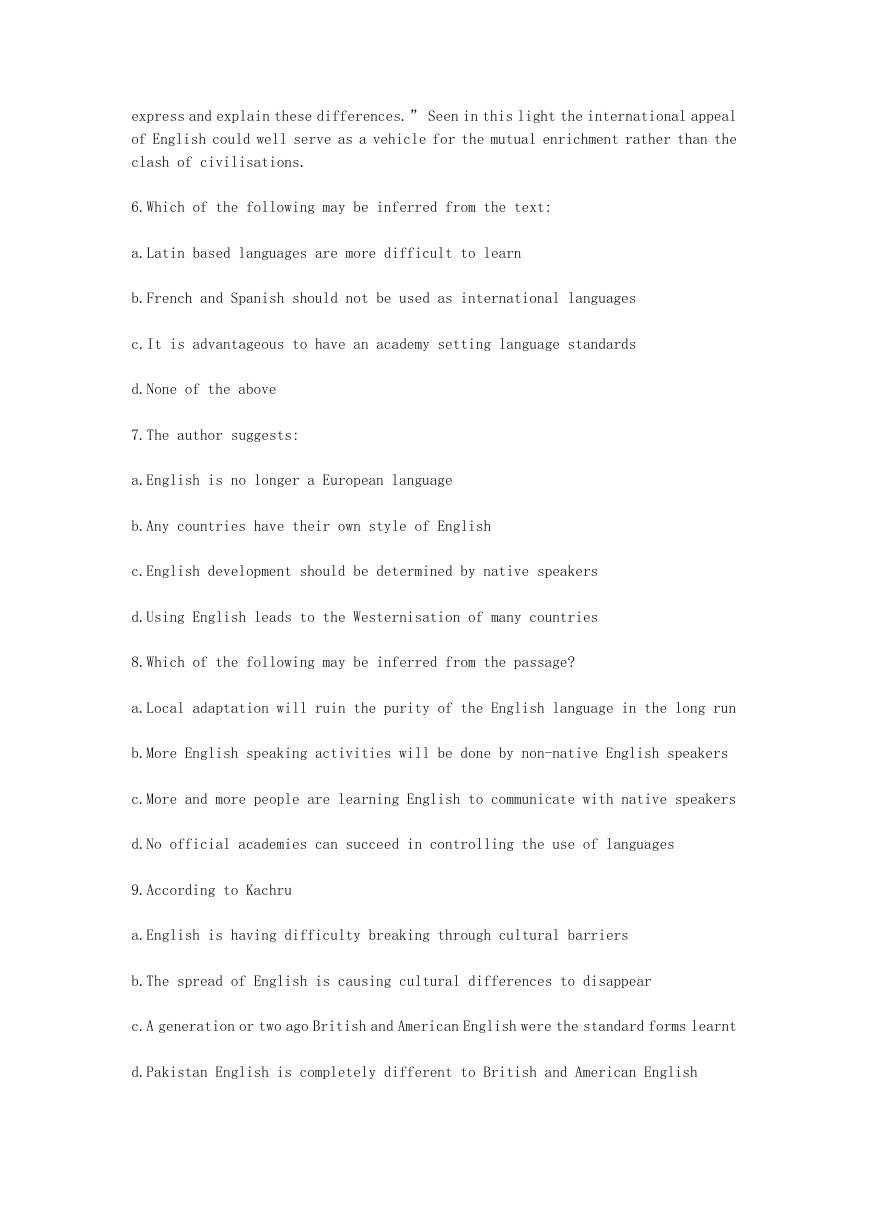
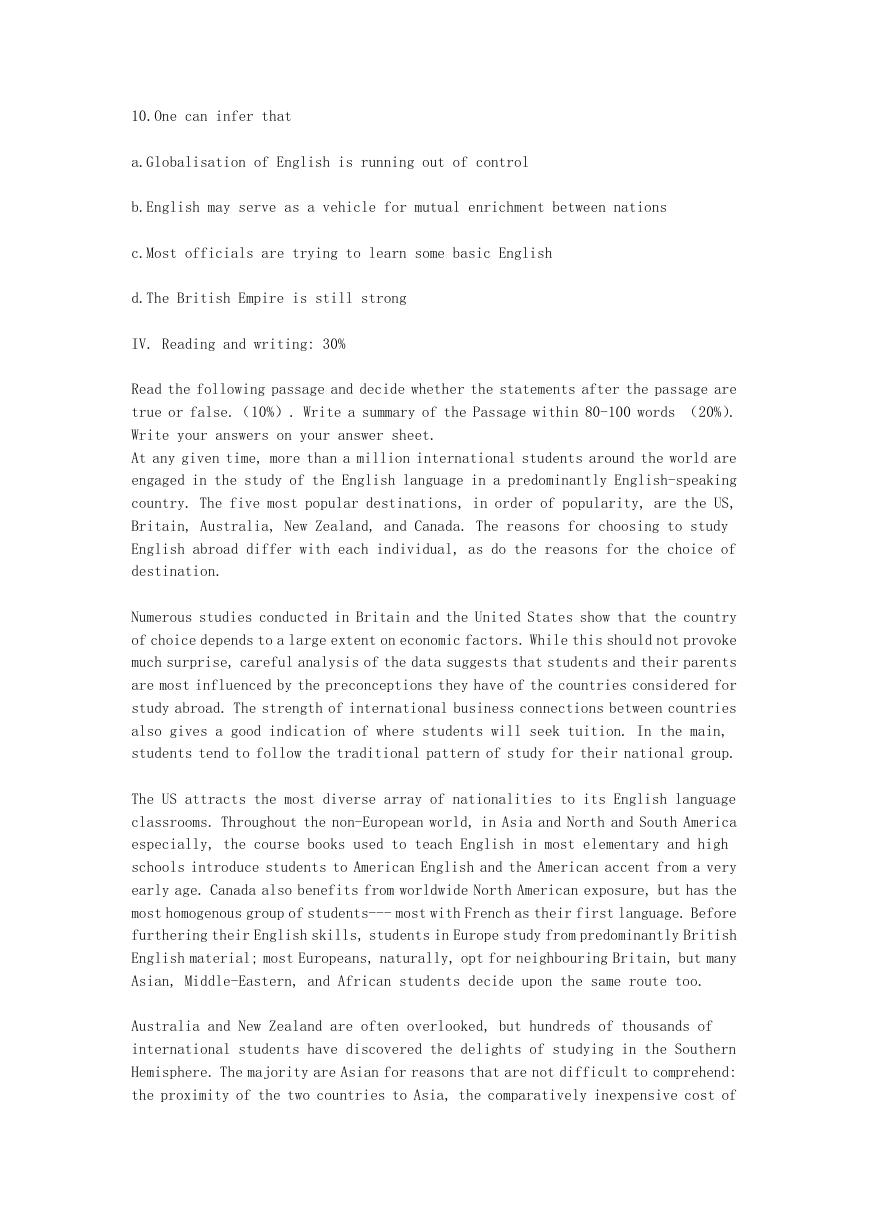
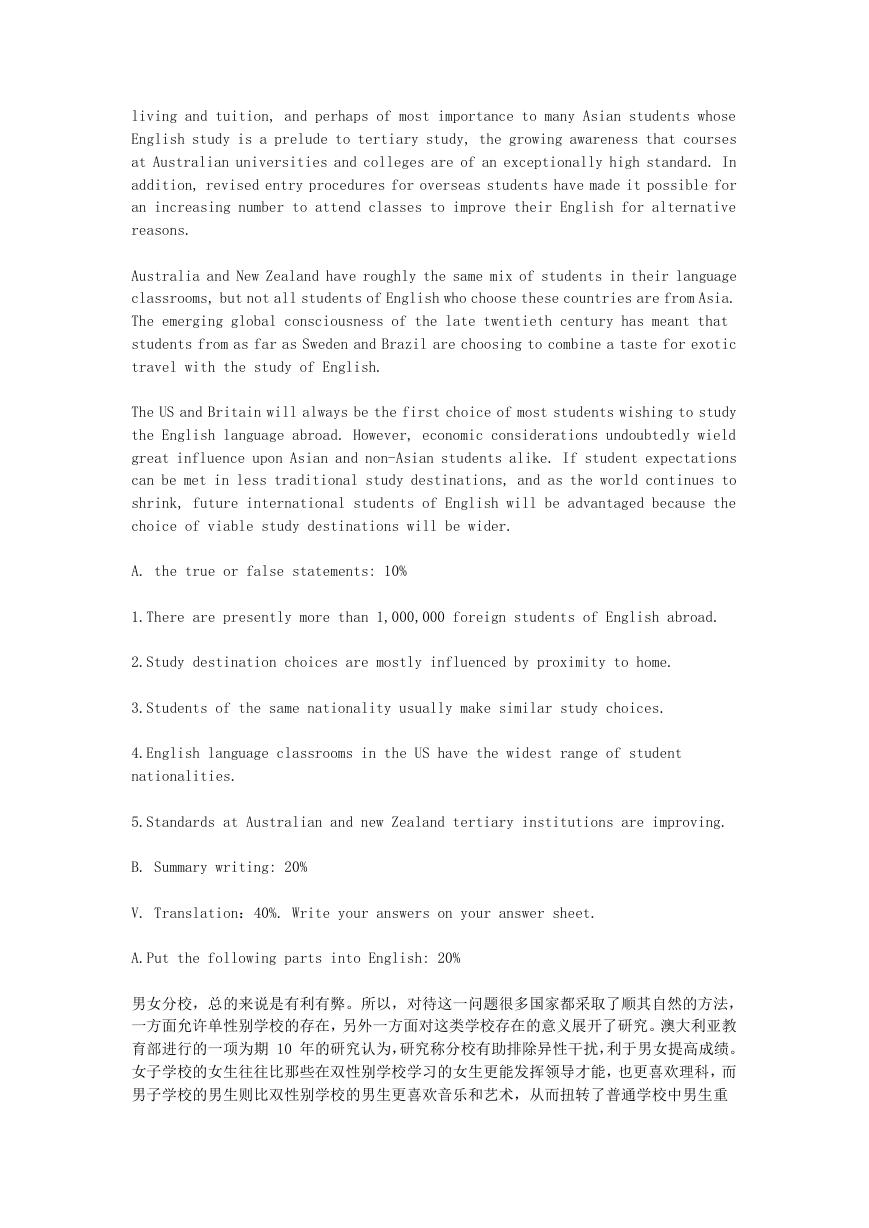








 2023年江西萍乡中考道德与法治真题及答案.doc
2023年江西萍乡中考道德与法治真题及答案.doc 2012年重庆南川中考生物真题及答案.doc
2012年重庆南川中考生物真题及答案.doc 2013年江西师范大学地理学综合及文艺理论基础考研真题.doc
2013年江西师范大学地理学综合及文艺理论基础考研真题.doc 2020年四川甘孜小升初语文真题及答案I卷.doc
2020年四川甘孜小升初语文真题及答案I卷.doc 2020年注册岩土工程师专业基础考试真题及答案.doc
2020年注册岩土工程师专业基础考试真题及答案.doc 2023-2024学年福建省厦门市九年级上学期数学月考试题及答案.doc
2023-2024学年福建省厦门市九年级上学期数学月考试题及答案.doc 2021-2022学年辽宁省沈阳市大东区九年级上学期语文期末试题及答案.doc
2021-2022学年辽宁省沈阳市大东区九年级上学期语文期末试题及答案.doc 2022-2023学年北京东城区初三第一学期物理期末试卷及答案.doc
2022-2023学年北京东城区初三第一学期物理期末试卷及答案.doc 2018上半年江西教师资格初中地理学科知识与教学能力真题及答案.doc
2018上半年江西教师资格初中地理学科知识与教学能力真题及答案.doc 2012年河北国家公务员申论考试真题及答案-省级.doc
2012年河北国家公务员申论考试真题及答案-省级.doc 2020-2021学年江苏省扬州市江都区邵樊片九年级上学期数学第一次质量检测试题及答案.doc
2020-2021学年江苏省扬州市江都区邵樊片九年级上学期数学第一次质量检测试题及答案.doc 2022下半年黑龙江教师资格证中学综合素质真题及答案.doc
2022下半年黑龙江教师资格证中学综合素质真题及答案.doc